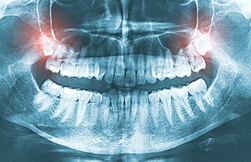What to Expect After a Wisdom Tooth Extraction
Posted on 9/1/2025 by Surprise Oral & Implant Surgery |
 Wisdom teeth are the third and final set of molars that typically erupt in the late teens or early twenties. However, not everyone has wisdom teeth, and for some people, they may cause problems like crowding, impaction, or infection. In these cases, wisdom tooth extraction may be necessary. Wisdom teeth are the third and final set of molars that typically erupt in the late teens or early twenties. However, not everyone has wisdom teeth, and for some people, they may cause problems like crowding, impaction, or infection. In these cases, wisdom tooth extraction may be necessary.
If you're facing wisdom tooth extraction, it's natural to feel some anxiety. But knowing what to expect can help you feel more prepared and comfortable. So, let's dive into the recovery process and what you can do to ensure a smooth healing journey.
Immediately After the Extraction
Once the extraction is complete, you'll likely experience some bleeding and swelling. Your dentist will provide you with gauze to bite on, which will help control the bleeding. You can expect the bleeding to subside within a few hours, but the swelling may peak within 2-3 days and gradually decrease over the following week.
During this initial phase, it's crucial to rest and avoid strenuous activities. You should also avoid smoking, using straws, and spitting, as these actions can dislodge the blood clot forming in the extraction site and delay healing.
Managing Pain and Discomfort
Your dentist will prescribe pain medication to manage discomfort. Be sure to follow the instructions carefully and take the medication as directed. You can also apply an ice pack to the affected area for the first 24-48 hours to reduce swelling.
Maintaining Oral Hygiene
Keeping your mouth clean is essential for preventing infection and promoting healing. However, you need to be gentle with the extraction site. Here's how to maintain proper oral care:
| • |
Rinse gently: Rinse your mouth with a saltwater solution (1/2 teaspoon salt dissolved in a cup of warm water) several times a day, starting 24 hours after the extraction. Avoid vigorous rinsing or brushing near the extraction site. |
| • |
Brushing and flossing: You can resume brushing and flossing the rest of your teeth 24 hours after the extraction. Be gentle and avoid the extraction site for the first few days. |
Diet and Nutrition
During the first 24 hours, stick to soft foods like yogurt, applesauce, and mashed potatoes. As the swelling and discomfort subside, you can gradually introduce more solid foods. Avoid hard, crunchy, or spicy foods that can irritate the extraction site.
It's important to stay hydrated by drinking plenty of fluids. However, avoid hot beverages and alcohol, as they can irritate the extraction site and slow healing.
Follow-Up Care
Your dentist will likely schedule a follow-up appointment a week after the extraction to monitor your healing progress. They may remove any stitches and check for signs of infection.
If you experience excessive bleeding, severe pain, or signs of infection (such as fever, pus, or swelling that doesn't improve), contact your dentist immediately.
Healing Timeline
The healing process after a wisdom tooth extraction typically takes 7-10 days. However, complete healing may take several months. During this time, you may experience some tenderness and discomfort, which is normal.
Here's a general timeline of what to expect:
| • |
Days 1-3: Swelling and discomfort are at their peak. Rest, ice the area, and take pain medication as directed. |
| • |
Days 4-7: The swelling starts to subside, and you can gradually introduce more solid foods. Continue to rinse with saltwater and be gentle with your oral hygiene routine. |
| • |
Week 2-3: The extraction site starts to heal, and the discomfort should significantly decrease. You can resume most of your normal activities. |
| • |
Months 3-6: The bone continues to heal, and the extraction site should be fully healed. |
Restoration Dentistry
In some cases, depending on the position of the extracted wisdom teeth and your individual needs, your dentist may recommend restoration dentistry options like implants or bridges to replace the missing teeth and maintain proper bite function.
Final Thoughts
Wisdom tooth extraction is a common procedure that can bring relief from pain and prevent future complications. By following your dentist's instructions and taking good care of yourself during the recovery process, you can ensure a smooth and comfortable healing journey. Remember, if you have any concerns or experience any unexpected symptoms, don't hesitate to contact your dentist.
|
|
